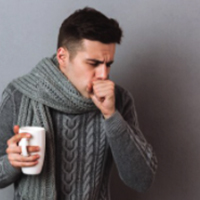Non-pharmacological remedies for post-viral acute cough

All claims expressed in this article are solely those of the authors and do not necessarily represent those of their affiliated organizations, or those of the publisher, the editors and the reviewers. Any product that may be evaluated in this article or claim that may be made by its manufacturer is not guaranteed or endorsed by the publisher.
Authors
The post-viral acute cough (PAC) is a widespread symptom, mainly in childhood and adolescence, and is usually associated with an acute upper respiratory infection, namely the common cold. The use of cough relievers is, therefore, impressive, as documented by the market data. There are many medical devices and dietary supplements for treating PAC, which contain non-pharmacological components. Ancient people used traditional herbs to treat PAC. Thus, a well-established tradition considers natural remedies as an effective and safe way to relieve PAC. The herbal agents include polyphenols, flavonoids, saponins, glucosides, and alkaloids. Also, the European Medicine Agency has recognized the value of plant extracts and other natural substances to treat PAC. Nevertheless, a few studies investigated the role of non-pharmacologic remedies for PAC. There is some evidence for honey, glycerol, Althea officinalis, Drosera rotundifolia, Grindelia, Hedera helix, Pelargonium sidoides, Sambucus nigra, Thymus vulgaris, hyaluronic acid, and saline solutions. However, further rigorous studies should confirm natural products' efficacy and safety to relieve PAC.
How to Cite

This work is licensed under a Creative Commons Attribution-NonCommercial 4.0 International License.






